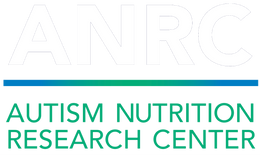Follow-up Consult (30 minutes)
Includes discussion of any changes in symptoms and concerns, following up on any progress made, revision of personalized education if necessary, and follow-up emails.
The 4 Key Parts of the ANRC Guidelines
The Autism Nutrition Research Center’s guidelines are designed to provide optimal nutritional support for most children and adults with autism. It includes a comprehensive set of vitamins, minerals, essential fatty acids, l-carnitine, and a healthy allergen-free diet. The ANRC Guidelines are based primarily on several major research studies and clinical trials conducted by Prof. James Adams at Arizona State University, as well as studies by many other researchers around the world. In just 120 days, the ANRC Guidelines will provide comprehensive nutritional support, to maximize brain and body function.
Quick FAQs
For more information and frequently asked questions, head over to our FAQ page.
How do I get my child to take supplements?
First, explain to them that the supplements are like medicine, and are designed to help them feel better.
Powder: We recommend letting the child pick their favorite strong-tasting juice (cranberry, grape, mango, etc.). Then, give them a sip of pure juice (to coat the tongue), then the powder mixed with juice, and then pure juice.
Alternatively, some parents have mixed the powder with melted dark chocolate with a little coconut oil, and then let it cool in a mold in the fridge. Dairy-free chocolate is available. There are also easy recipes to make your own gummy vitamins (ie WellnessMama.com and NourishingJoy.com just to name 2 online resources).
Another good resource with ideas: https://www.naturedoc.co.uk/10-cunning-ways-hide-kids-vitamins/ or
https://www.autismdietitian.com/blog/5-tips-supplements. A wonderful resource in general is TACA. They have a great article on how to get your child to take supplements, see: https://tacanow.org/family-resources/ideas-to-help-your-child-take-supplements/
Swallowing Pills: Start with very small pills that are empty (they can be purchased at most drugstores) and take them with water or juice. Slowly work up to larger pills. Nordic Naturals sells a junior version of fish oil that comes in very small gelcaps that are also good to start with. Or look into aids such as the OralfloTM (www.oralflo.com) pill swallowing cup which could possibly help with learning to swallow pills/capsules.
Please note: ANRC Essentials Plus Capsules may be opened and used like the powder if needed. The powder and capsules are from the same blend. Rewards/Bribery also helps (hugs, praise, extra tv/videogame time, etc).
Should I try to hide supplements in food?
How do I know if my child will benefit from a vitamin/mineral supplement?
How do I know what dosage is best?
Should I try Methyl-B12 injections in addition to ANRC Essentials?
Is it dangerous to take too much of a vitamin/mineral supplement?
Is it better to take a vitamin/mineral supplement or eat fruits and vegetables?
How do I know if I need extra vitamin D?
Do I need extra iron?
Diet
How do I get my child to eat more vegetables?
How do I get my child to eat more protein?
How do I know if the GFCF diet will help?
Is it better to eat fish or take a fish oil supplement?
How do I choose a high-quality fish oil supplement?
Supplements
How do I know what supplements to try?
Should I consider blood tests before taking supplements?
Should I try injections of vitamin B12?
Should I try a hair test to determine the need for essential minerals?
How do I know what fish oil to try?
Should I take cod liver oil or fish oil?
GET IN TOUCH
STILL HAVE A QUESTION?
CONTACT USDONATE TO ANRC RESEARCHQUESTIONS? CONTACT USTHE ANRC GUIDELINESGET THE ANRC APPQUICK LINKS
CUSTOMER CARE
STAY CONNECTED
Sign up for our latest news, special offers, and other content — directly to your inbox.
SUBSCRIBE
© 2023ANRC.
Enable Accessibility
How do I know if my child will benefit from a vitamin/mineral supplement?
For vitamin/mineral supplements, a 2-3 month trial is usually enough to determine if there is benefit. In the Adams et al 2012 study, about 1/3 of participants found no benefit, about 1/3 had some benefit, and about 1/3 had substantial benefit. Although medical testing of nutritional status can be done, it is easier, cheaper, and more reliable to just try it. Children with limited diets without enough vegetables, fruits, and meats/protein are likely to benefit the most.
How do I know what dosage is best?
In the Adams et al 2012 study, most participants gradually increased to the full dose of the vitamin/mineral supplement over 3 months. However, a few families found that their child did better at 50-75% of the full dose, so they stayed at that dose. Each child is an individual, so it is okay to individualize their dosage.












